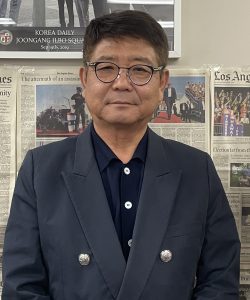Shin Dong-Yeop, the longtime head of Nongshim America, has retired after 34 years leading the company’s U.S. operations and 43 years with Nongshim overall. Widely credited with expanding the footprint of Korean ramen across the United States, Shin stepped down from frontline management in July.
Shin first moved to Los Angeles in 1991, where he oversaw the establishment of Nongshim America in 1994. He became the subsidiary’s first CEO and laid the foundation for its long-term growth with a focus on localization. Under his leadership, Nongshim reached critical milestones: the opening of the Rancho Cucamonga plant in 2005, the first direct supply deal with Walmart in 2013, and the rollout of Shin Ramyun across all 4692 Walmart stores nationwide in 2017—a symbolic turning point for Korean food’s entry into the U.S. mainstream.

The company’s U.S. expansion accelerated with cultural marketing campaigns, including food truck events in New York’s Times Square, tie-ins with K-dramas and K-pop, and playful messaging such as “Wanna eat ramyun?” More recently, Nongshim opened the House of Shin Ramyun pop-up in Los Angeles’ Koreatown, targeting Latino consumers, and partnered with Netflix’s animation ‘K-Pop Demon Hunters’ for limited-edition packaging featuring popular characters.
Nongshim’s U.S. operations grew from modest beginnings to a powerhouse producer. The Rancho Cucamonga plant’s six production lines initially supplied 200 million packs annually, reducing logistics costs and stabilizing supply. The launch of a second plant in 2022 raised annual output to more than 1 billion packs in 2023, enabling further penetration into mass retail.
Nongshim America has reported consistent double-digit growth since 2010, with sales surging 40% in 2022 to $443 million as pandemic-driven demand for instant meals accelerated. The subsidiary now employs more than 420 people and manufactures around 30 product lines. The company’s long-term target is to reach $1.5 billion in annual North American sales by 2030.
Still, profitability challenges remain. Net income fell 25.5% in 2024, prompting Nongshim to bet on new products such as Shin Ramyun Tumba to sustain momentum. Shin also sees opportunities in broader Korean condiments:
“As ramen gained popularity, consumer interest expanded to sauces—both noodle-related and traditional Korean flavors like namul sauces,” he noted.
Reflecting on his retirement, Shin highlighted ramen’s symbolic journey:
“Ramen is Korea’s soul food, and in the U.S. it came to be recognized the same way. The greatest achievement was its transformation from an immigrant staple to a global premium food.”
Shin’s departure closes a remarkable chapter in Nongshim’s history, but the infrastructure, brand equity, and cultural resonance he built leave a strong foundation for the company’s next phase of growth in the U.S.
BY EUNYOUNG LEE [lee.eunyoung6@koreadaily.com]



